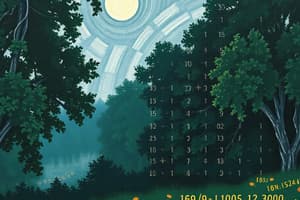Podcast
Questions and Answers
Define a square number and provide an example.
Define a square number and provide an example.
A square number is the product obtained when a natural number is multiplied by itself. For example, 4 is a square number because it is equal to $2^2$ (2 x 2).
What property do the factors of a perfect square share?
What property do the factors of a perfect square share?
The factors of every perfect square can be grouped into pairs of equal numbers.
How can you determine if a number is a perfect square?
How can you determine if a number is a perfect square?
A number is a perfect square if its prime factors can be grouped into pairs of equal numbers.
Calculate the square of 25 and explain the process.
Calculate the square of 25 and explain the process.
What is the square root of 64?
What is the square root of 64?
State whether 50 is a perfect square and explain your reasoning.
State whether 50 is a perfect square and explain your reasoning.
What is the method to find the square of a decimal number, like 0.4?
What is the method to find the square of a decimal number, like 0.4?
Explain the relationship between square numbers and their square roots.
Explain the relationship between square numbers and their square roots.
Flashcards are hidden until you start studying
Study Notes
Square Numbers and Properties
- A square number, or perfect square, is generated when a natural number is raised to the power of 2, such as 1² (1), 2² (4), and 3² (9).
- A number multiplied by itself results in its square. For example, 4 is the square of 2, and conversely, 2 is the square root of 4.
Characteristics of Perfect Squares
- A natural number qualifies as a perfect square if it can be expressed as the product of an integer multiplied by itself.
- Not all natural numbers are perfect squares. Numbers such as 2, 3, 5, 6, 7, 8, 10, 11, and 12 do not meet this criterion.
- A distinct attribute of perfect squares is that their factors can be paired into equal groups, allowing them to be represented as a product of pairs of the same prime factors.
Methods for Finding Squares
- Various techniques exist to compute the squares of whole and rational numbers, including multiplication.
Example Calculations
- For 18, the square is calculated as:
- 18² = 18 × 18 = 324
- For 32, the square is computed as:
- 32² = 32 × 32 = 1024
Understanding Perfect Squares
- To determine if a number like 144 is a perfect square:
- The prime factorization method reveals that 144 can be expressed as:
- 144 = 2 × 2 × 2 × 2 × 3 × 3
- The prime factorization method reveals that 144 can be expressed as:
- This breakdown shows that 144 is indeed a perfect square because the prime factors can be grouped in pairs.
Studying That Suits You
Use AI to generate personalized quizzes and flashcards to suit your learning preferences.




